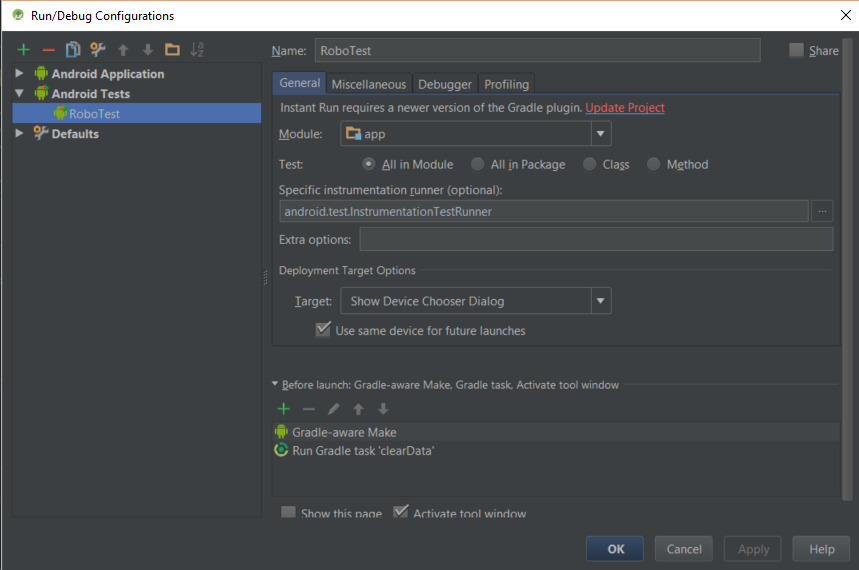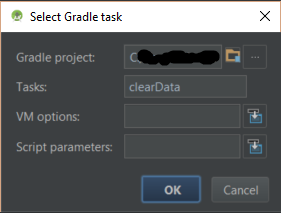How can I get Android Studio (AndroidJunitRunner) to clear application data preceding an instrumentation test without manually running adb command?
I discovered that android.support.test.runner.AndroidJUnitRunner kind of cheats -- it never actually invokes connectedCheck or connectedAndroidTest.
When run from command line
$ gradle connectedCheck:MyMainApp:assembleDebug UP-TO-DATE :MyMainApp:assembleDebugTest UP-TO-DATE :MyMainApp:clearMainAppData :MyMainApp:connectedCheckWhen run from within IDE by clicking the instrumentation test configuration (green Android robot logo with red/green arrows)
**Executing tasks: [:MyMainAppApp:assembleDebug, :MyMainAppApp:assembleDebugTest]**As you can see, the last gradle target is
assembleDebugTest
I had added a hook onto connectedCheck in build.gradle to clear the data of the main app before starting the instrumentation test.
// Run 'adb' shell command to clear application data of main app for 'debug' variant
task clearMainAppData(type: Exec) {
// we have to iterate to find the 'debug' variant to obtain a variant reference
android.applicationVariants.all { variant ->
if (variant.name.equals("debug")) {
def clearDataCommand = ['adb', 'shell', 'pm', 'clear', getPackageName(variant)]
println "Clearing application data of ${variant.name} variant: [${clearDataCommand}]"
commandLine clearDataCommand
}
}
}
// Clear Application Data (once) before running instrumentation test
tasks.whenTaskAdded { task ->
// Both of these targets are equivalent today, although in future connectedCheck
// will also include connectedUiAutomatorTest (not implemented yet)
if(task.name.equals("connectedAndroidTest") || task.name.equals("connectedCheck" )){
task.dependsOn(clearMainAppData)
}
}
I realize that alternatively I could implement a 'clear data' button in the main app and have the instrumentation app click through the UI, but I find that solution undesirable.
I looked at AndroidJUnitRunner API and there are hooks via Runlistener interface but hooks are during the context of the test app, i.e. running on device, and Android forbids one app from modifying another app.
http://junit.sourceforge.net/javadoc/org/junit/runner/notification/RunListener.html
Best answer goes to you if you can help me trigger one of the following automatically from within Android Studio:
- execute a command line
adb shell pm clear my.main.app.package, - or preferably invoke my gradle task
clearMainAppData
I'm also all ears if there is an alternate way. Surely with device testing automation there should be a clear way to clear application data?
Thank you!


